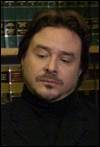Ex-Principal Can't Plead 5th on Abuse Questions
By Beth Miller
The News Journal
December 18, 2007
http://www.delawareonline.com/apps/pbcs.dll/article?AID=2007712180388
WILMINGTON -- A Superior Court judge has ruled that a former principal of Salesianum School must answer more questions today about sexual abuse allegations made against him by a former student in a 2004 lawsuit.
Attorneys for the student, Eric Eden of Wilmington, will depose the Rev. James W. O'Neill for the third time today. O'Neill, a priest with the Oblates of St. Francis de Sales, answered questions about Eden's allegations in the first deposition, taken in September 2004, but invoked his Fifth Amendment privilege against self-incrimination more than 190 times in a second deposition last July.
In a Friday hearing before Judge Charles L. Scott Jr., O'Neill's attorneys -- Thomas P. Bernier of Baltimore and John P. Deckers of Wilmington -- argued the priest should not have to answer questions that could be used against him later in criminal proceedings in other states.
"Allegations by Mr. Eden are a far cry from admission under oath in a deposition," Bernier told the judge last week.
 |
| Former Salesianum student Eric Eden has brought sexual abuse allegations against the Rev. James W. O'Neill in several states. |
Neither Bernier nor Deckers returned calls Monday, but in a written opinion, Scott agreed with part of their argument, saying O'Neill could "claim the [Fifth Amendment] privilege" when questions are asked about abuse Eden claims occurred in trips to Pennsylvania, Maryland, Virginia and North Carolina. Maryland, Virginia and North Carolina have no criminal statute of limitations for felonies such as child sexual abuse.
In Pennsylvania, the legal time limit can be tolled when a person "responsible for the child's welfare" injures the child. Scott said it is questionable whether O'Neill fits that description, but said where there is such doubt, the privilege must be granted.
Questions related to alleged incidents in Delaware and New Jersey must be answered, Scott said, because the criminal statute of limitations has expired in both states and because O'Neill already answered some questions in the 2004 deposition.
"We appreciate the time and concern the judge put into this, and we look forward to continuing with the deposition," said Stephen J. Neuberger, one of Eden's attorneys.
Eden, whose name was Eric Mazzetti when he was attending Salesianum, claims O'Neill abused him hundreds of times during a nine-year period that ended in 1985 after he told his parents. O'Neill has denied the allegations in court filings, but acknowledged in the 2004 deposition that he had been confronted by a superior about allegations of "inappropriate behavior" with a child "on a night that I had been drinking."
Jules Epstein, who teaches criminal law and evidence at Widener University School of Law, said "taking the Fifth" should not be interpreted as evidence of guilt. It's a smart decision if transcripts of testimony could be used in later legal actions. If someone is sued for damages from an auto accident, for example, some questions might produce incorrect assumptions, he said.
"You can be innocent and still take the Fifth," Epstein said.
But when a person answers questions in one deposition, he probably cannot take the Fifth to avoid answering them at a subsequent deposition, he said. "The judge is right. If you already answered the question, you can't put the genie back in the bottle."
In a separate but related decision, Scott refused to allow Eden to amend his lawsuit to include a list of 31 other priests accused of sexually abusing children, but said the Oblates and Salesianum officials should be prepared to defend themselves against charges of fraud.
Eden wanted to add the names of other accused priests to illustrate the way church officials allegedly conspired to handle abuse claims -- by quietly transferring priests to other parishes, schools or dioceses. Among the priests Eden wanted to add were 20 whose names were released last year by Bishop Michael A. Saltarelli as those against whom the diocese had received credible allegations of child sexual abuse.
In previous hearings, church attorneys argued that adding allegations against other priests would make their job overwhelmingly difficult, forcing them to investigate each allegation, some of which concern incidents more than 50 years old. In addition, they said, none of those priests had anything to do with the Eden case.
Scott agreed, and denied the request to add the names.
He said, though, that Eden had met the requirements of the law to add a claim of conspiracy to his complaint. Eden claims his parents agreed not to sue the religious order or the school after officials promised O'Neill would have no further access to children, would receive treatment and would be removed from ministry. Later, Eden said, the family learned O'Neill had been transferred to a Philadelphia school and then to a pastorate in North Carolina. Officials of the school and religious order have said they have no evidence any such agreement existed.
"Mr. Eden claims the Oblates and Salesianum somehow could have prevented something from happening to him 17 years before anyone -- including him -- knew it was happening," said Mark Reardon, who represents the Oblates and Salesianum. "Mr. Eden says they fraudulently concealed the whereabouts of Mr. O'Neill for 17 years, during which he was principal of a high school and pastor at a parish and continued to exchange holiday cards with the plaintiff's mother."
Eden's case is scheduled for trial in October 2008.
Contact Beth Miller at bmiller@delawareonline.com or 324-2784
Any original material on these pages is copyright © BishopAccountability.org 2004. Reproduce freely with attribution.